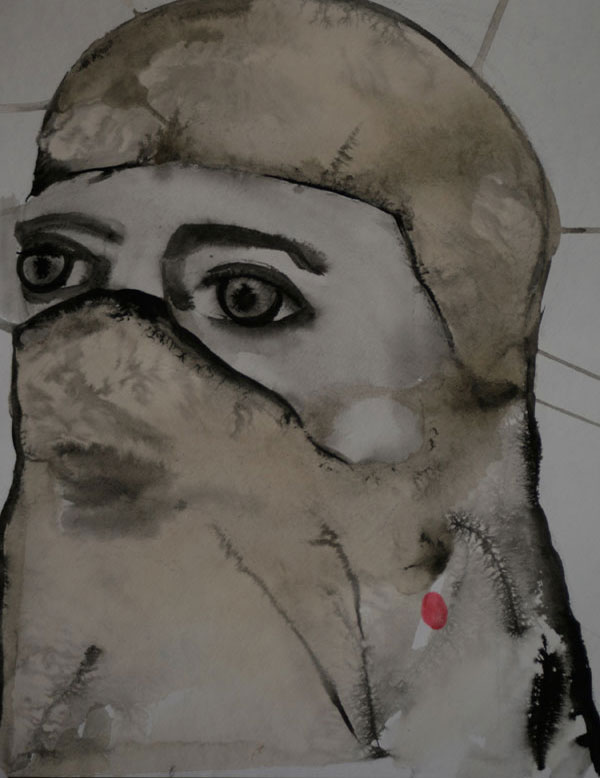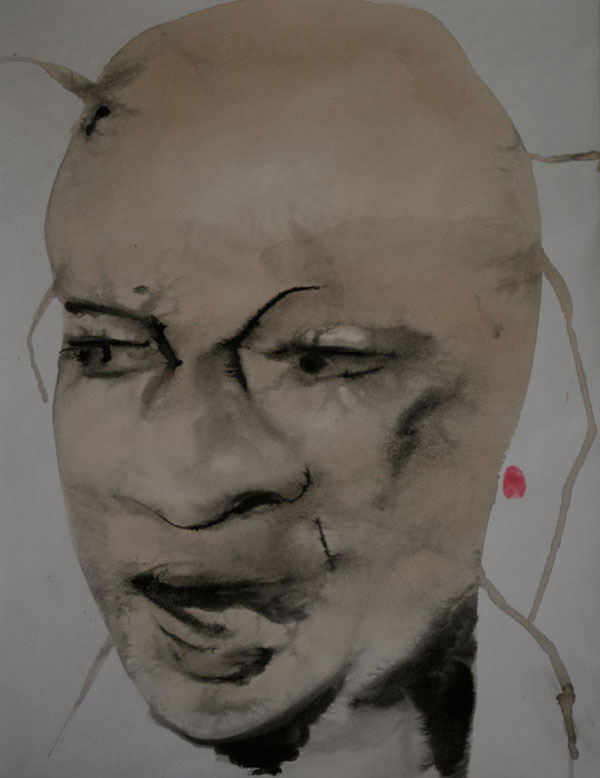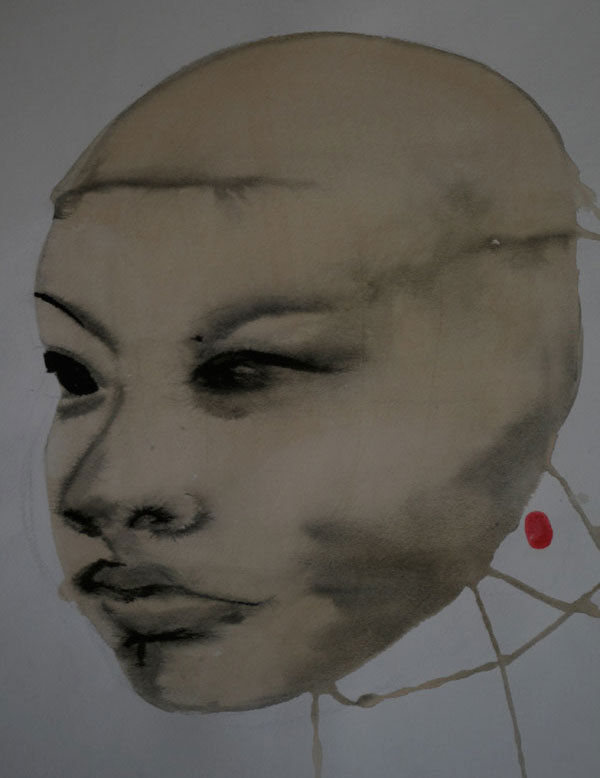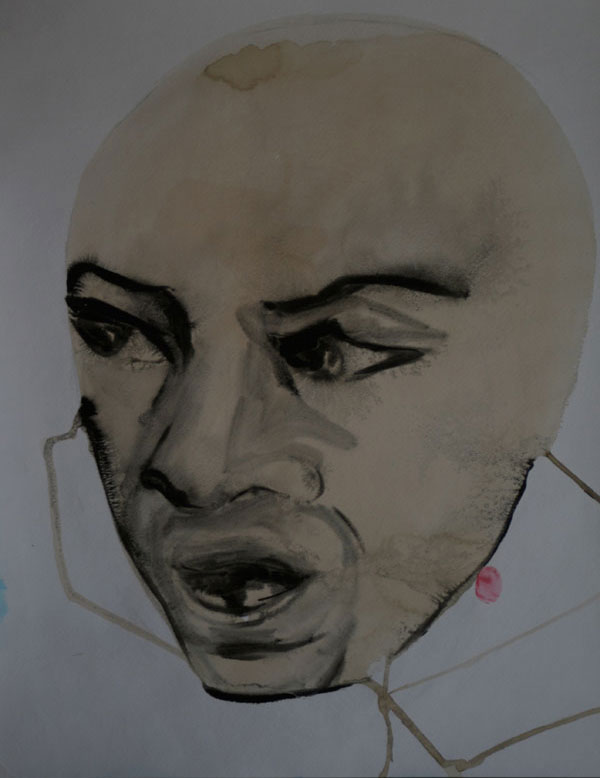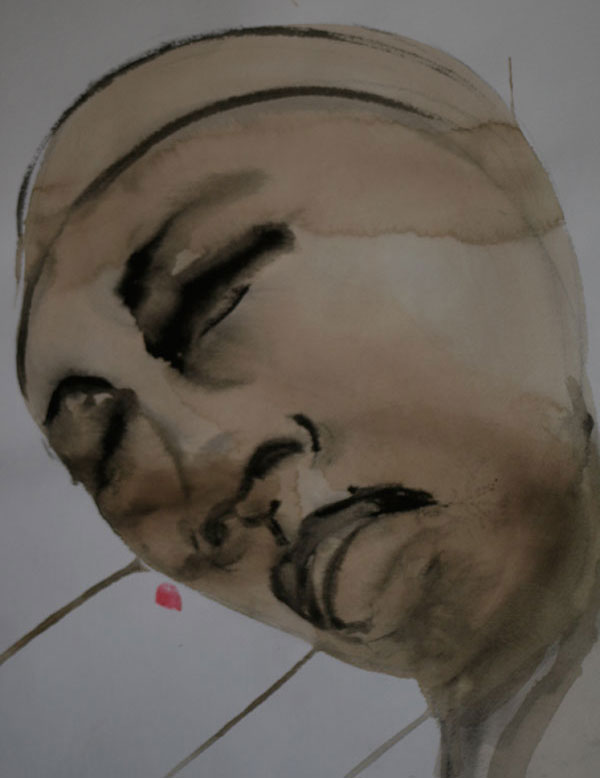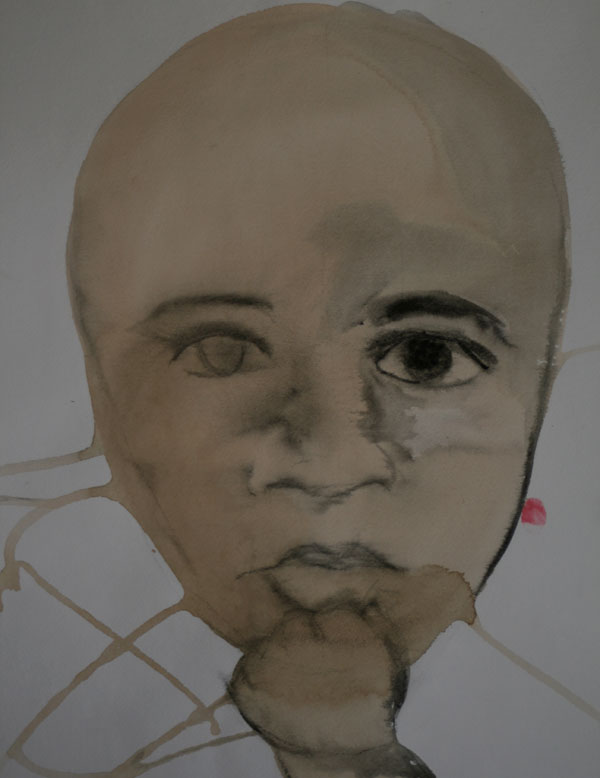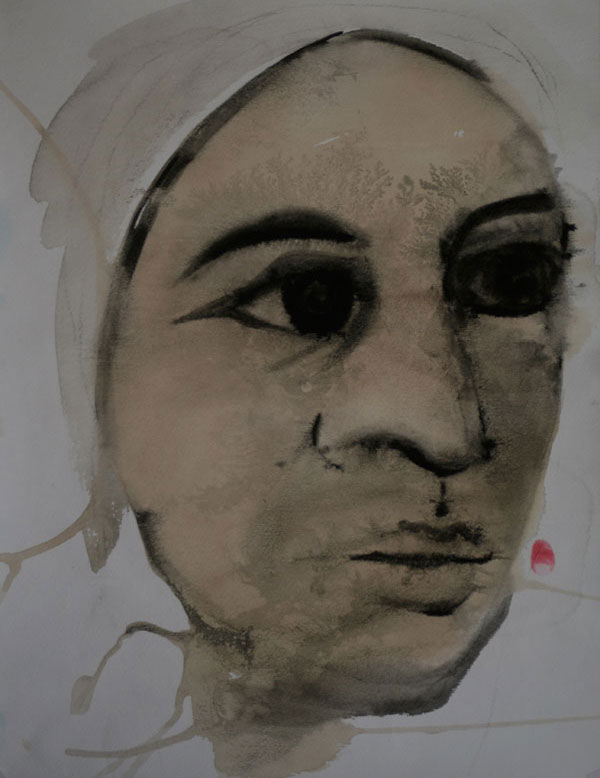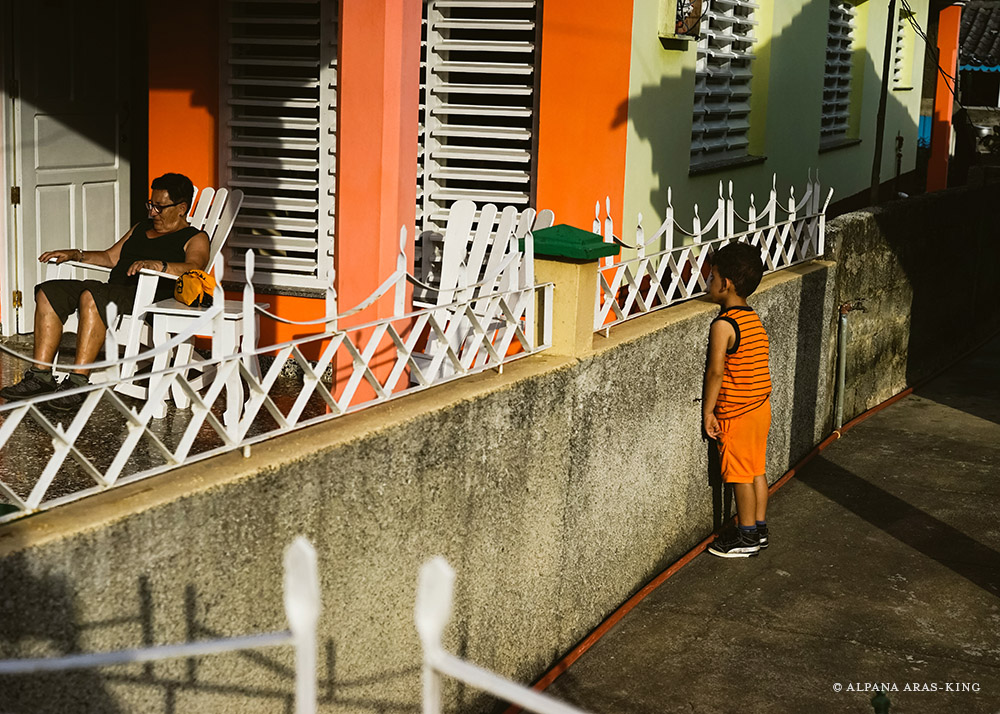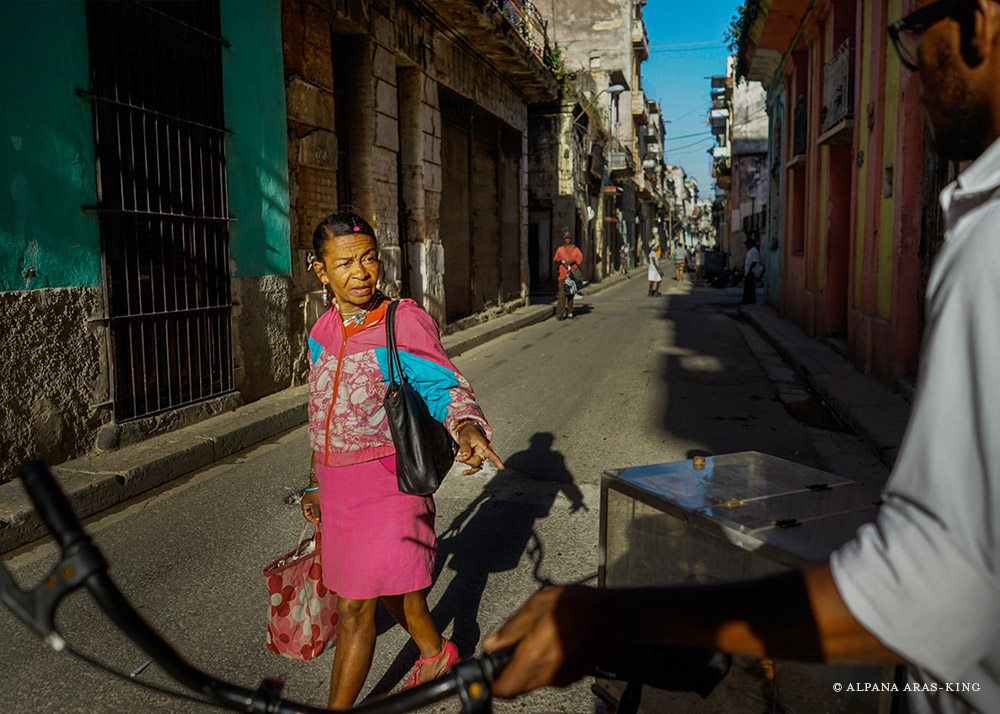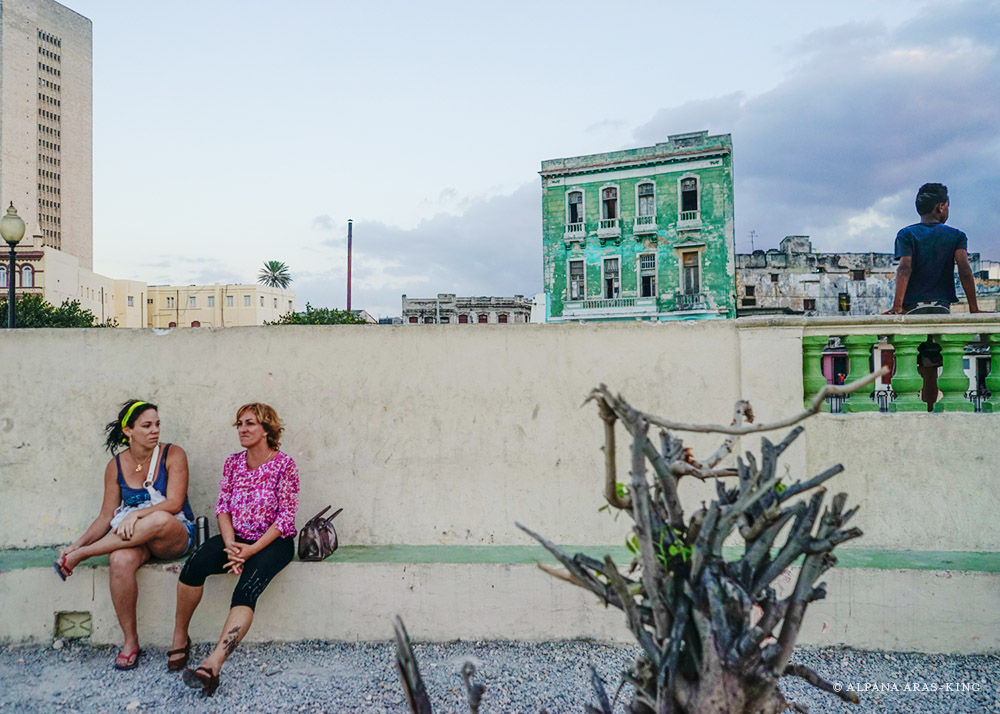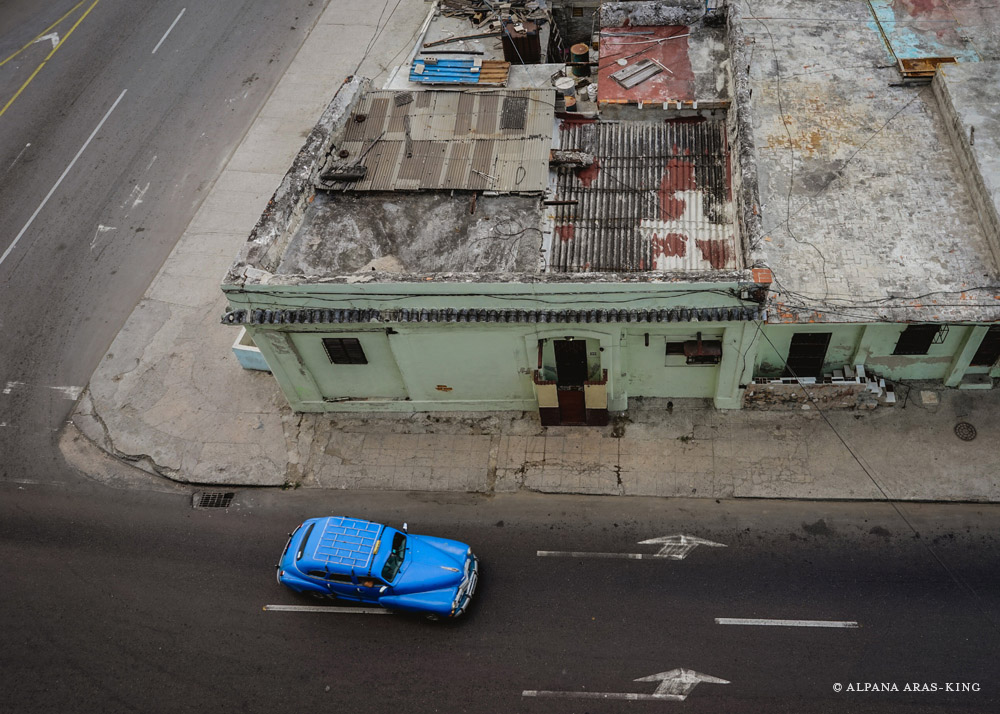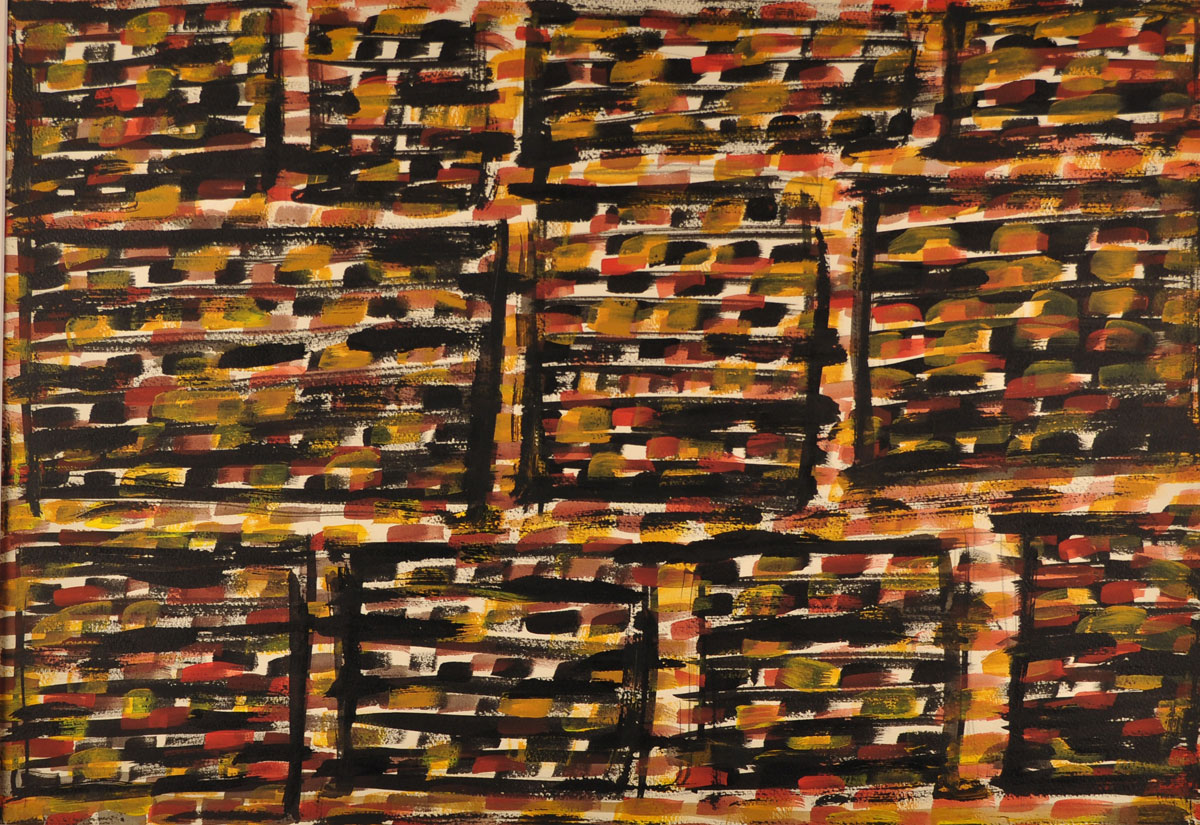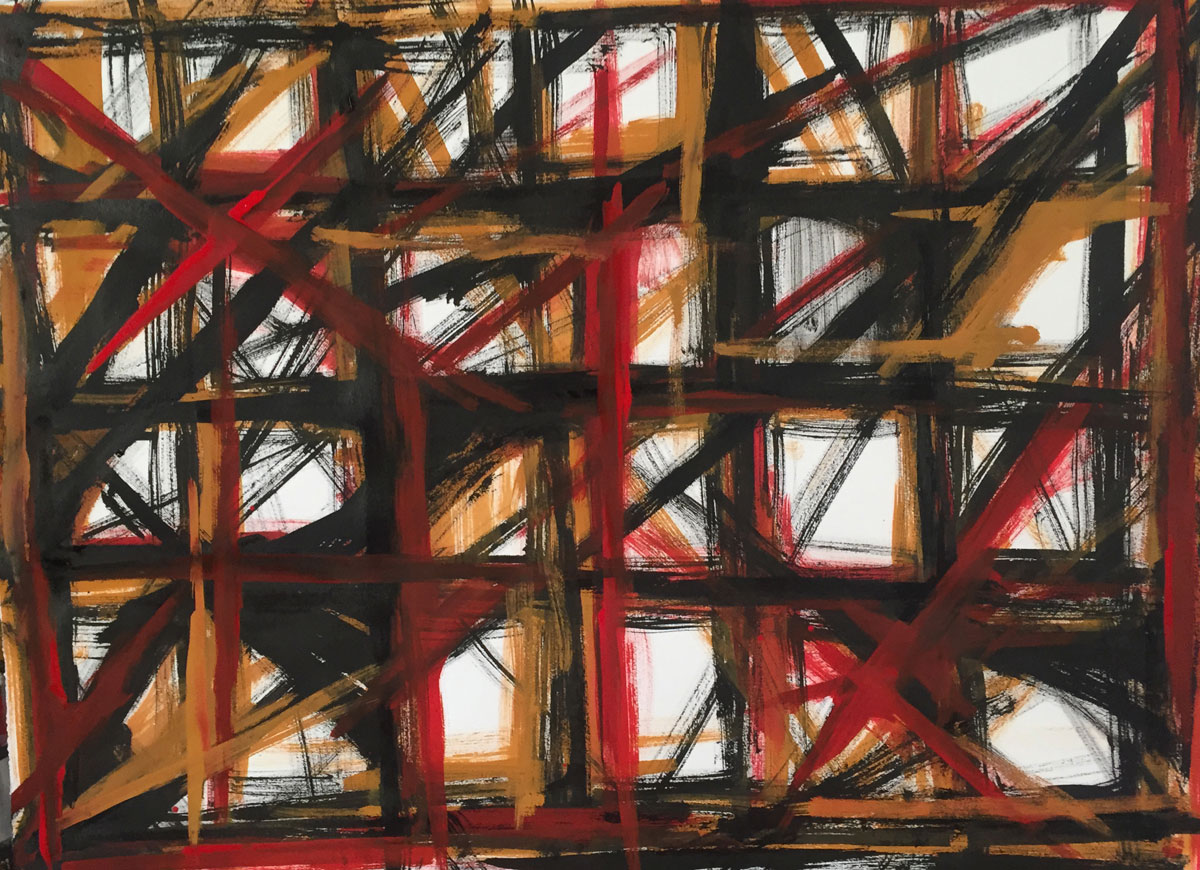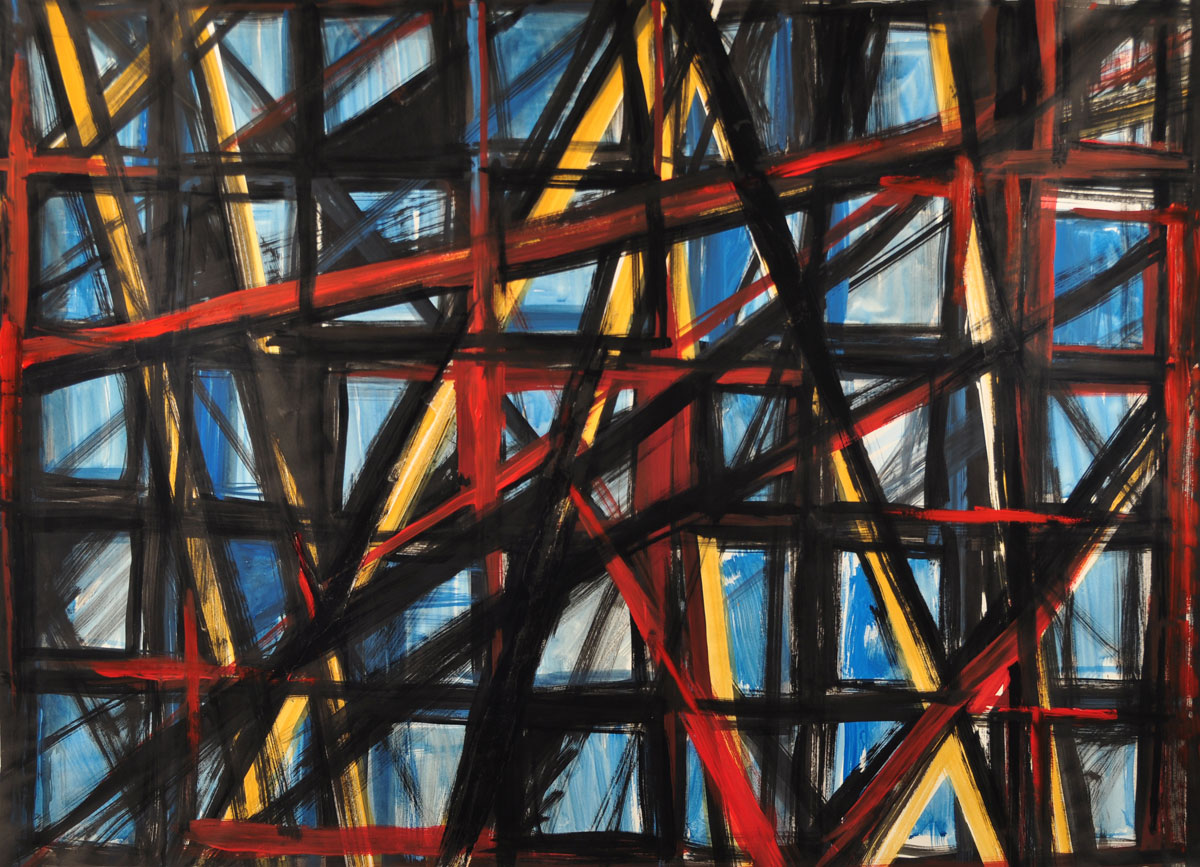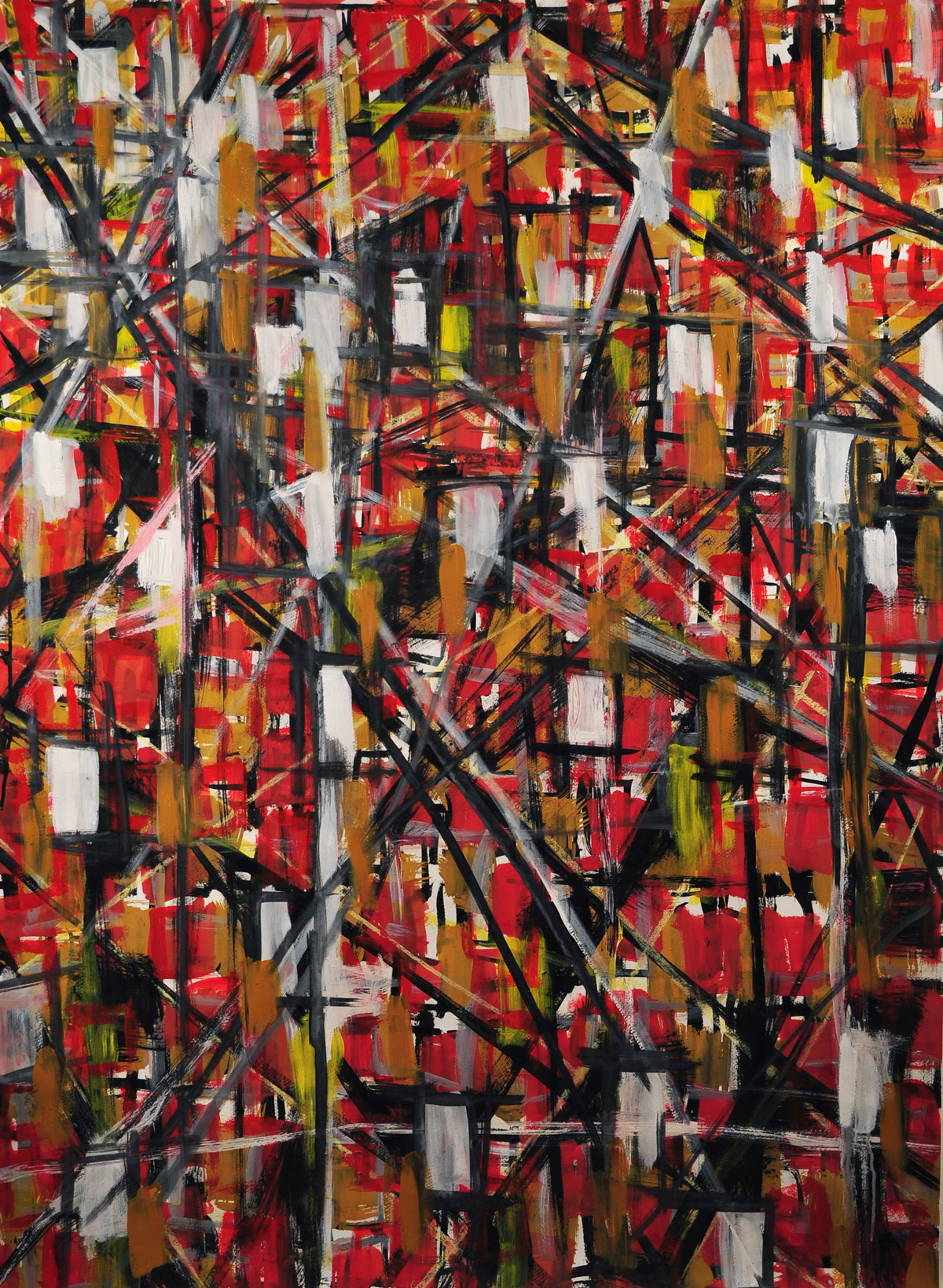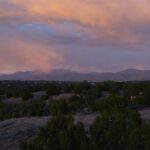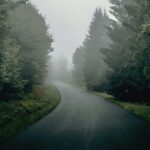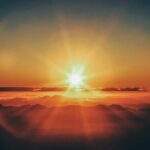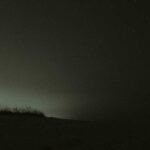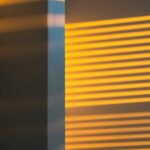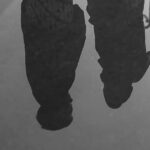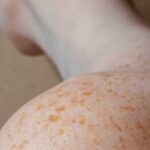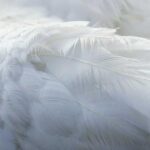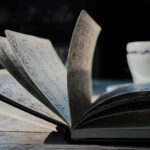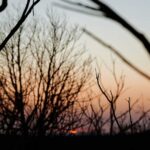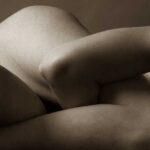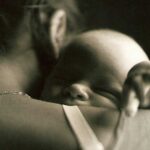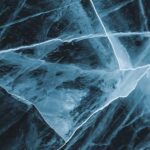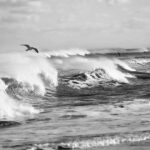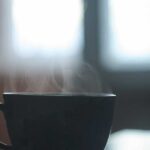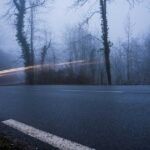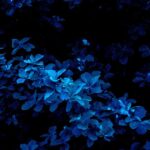ARTISTS-IN-RESIDENCE
★ ★ ★ ★
SHIFTING BORDERS
We love artists at The Wild Word.
Our Artist-in-Residence page provides a space for artists to showcase their work and to spread their creative wings. In their month of residency, invited artists are encouraged to collaborate with other contributors within the magazine, to experiment and develop new projects, while giving us an insight into their creative process.
Our EARTH issue Artists-in-Residence is the artist collective – Shifting Borders.
ABOUT THE COLLECTIVE
WORDS BY EMER MARTIN
Earth
We live here. All of us. Crisscrossing this one shared planetary moment. How can we ever understand what we are, where we are, or what we should be in such a blink of time? Instead, we build fences, walls, claim territory, grind her, plough her, mine her, frack her, divide her; claim her, fight over her. We were a trickle that became an infestation, a tickle that became a poison. Do we ever sit still and listen?
100,000 years ago a small group of humans walk out of Africa, spreading over the world in successive migrations. Protean creatures we are, we become smaller, or taller, blonder or develop red, curly hair, straight hair, blue eyes, almond eyes. In the searing sun outback of Australia we kept our colour, but in the North cold sun-starved regions, our color drains, we lose our pigment, but still have all the same roots, are the same tribe.
We forget. We make up stories. Our stories become sacred. We start fighting for these stories that we just made up. When people don’t believe our stories and follow their own we want to kill them.
Restless we are and have always been.
We can unteach what will hurt us.
The bigger-brained Neanderthals were probably our first victims. The first ethnic cleansing. The first indigenous to be absorbed, or colonized, and ultimately destroyed by our expansion.
Regions armed with guns and germs enriched themselves off of the less industrialized.
We are always on the move, crossing mountains, blindly walking through deserts, swimming over oceans, sailing on small ships. Dissatisfied, wanting.
Humans flow over the earth, always a swirling current, now a rising flood. Once again we are on the move; the borders are shifting.
We have a new story to write.
What if neither Europe nor the U.S. needs to remain white?
What if the mass migrations are not the problem?
What if the problem is the war machine that reduced the migrants’ region to rubble?
What if the mothers and their children we have imprisoned for crossing our borders are the ones who came 20,000 years before us?
What if they are home?
What if the people of the South can be let into the North? Just as the people of the North took from the people of the South.
What if the humans from the North looked at the humans from the South and the humans from the East looked at the humans from the West?
What if we all suddenly remembered?
Can we understood how little time we will spend together here? The fragility is stunning. What if we stopped being scared?
* * * *
Our group works from the Bay Area in California, a privileged place at the edge of a giant continent that claims to police the world. We just had a show highlighting the Syrian refugee crisis. We also have a border just to the south where 60,000 migrant families arrived at the Southwest Border during the summer and fall of 2014. So the United States Department of Homeland Security (DHS) rapidly expanded centers of detention. It was a thought-out policy called “detention as deterrence.” This is contrary to international law. Now along the borders we have imprisoned women with their children without even assessing their claims. They have no rights. They have no ability to leave. They have committed one crime, the usual crime—they are poor, and their governments will not protect or provide for them. They, like many humans before them, migrated looking for a better life. These issues among others, environmental borders, personal borders, are ones we focus on in our individual work.
Our group #shiftingborders is a diverse and fluctuating group of artists who all migrated to Silicon Valley because of the opportunities offered in the high-tech industry to our partners or ourselves. We all work in different mediums and believe different things. We are very happy this month to share our work with The Wild Word, a new magazine dedicated to excellence in art and committed to the same core beliefs as ourselves. Because if we share one core belief, it is that art is more powerful when it means something, when it addresses social injustice, and when it attempts to explore the crisis and strain our planet is under.
Emer Martin
California June, 10th 2016
BORDER CROSSINGS
Art by Alka Raghuram
Poetry by Emer Martin

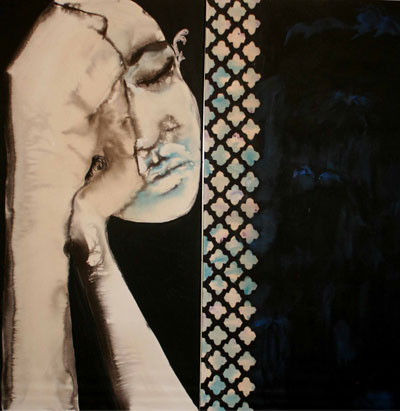

We are all migrants
Once upon a time
100,000 years ago
A small group of humans walk out of Africa:
We spread over the world.
Protean creatures,
Searching for scarce light,
Sun-starved, our color drains,
We lose pigment,
In the searing sun we keep our color,
In the East our eyes become almonds,
In the dark North our brown eyes become blue,
We forget.
We make up stories.
Our stories become sacred.
We fight for these stories
We kill for them
There is a new story yet to be written
We can unteach what will hurt us.
We can remember.
Detention as deterrence
The mothers and their children
Imprisoned for crossing our borders
Came here
20,000 years before us
They are home.
La detención como disuasión
Las madres y sus hijos
Encarcelados por cruzar nuestras fronteras
Vinieron
20,000 años antes que nosotros
Ellos están en casa
★ ★ ★ ★
Family Detention
Along our border
Imprisoned women with their children
In private for-profit Institutions
That the government promises to keep full
Have committed one crime,
the usual crime—they are poor,
they had hope,
they had courage.
Detención familiar
A lo largo de nuestra frontera
Mujeres presas con sus hijos
En instituciones con fines de lucro privadas
Las cuales el gobierno se compromete a mantener llenas
Han cometido un solo crimen,
El crimen común—son pobres,
Tenían esperanza.
Tenían valor.
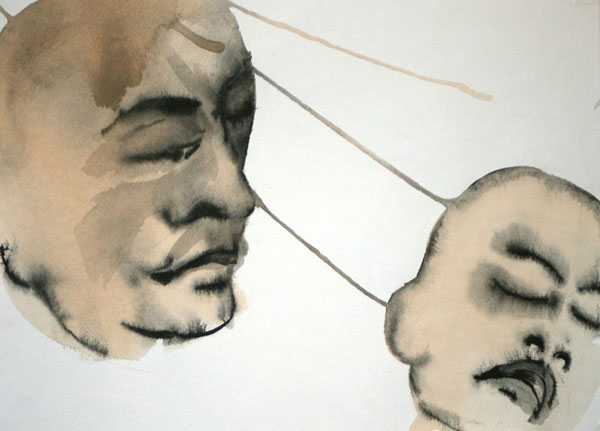
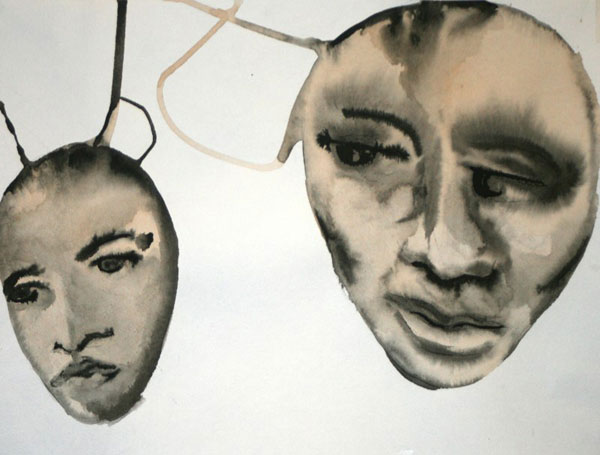
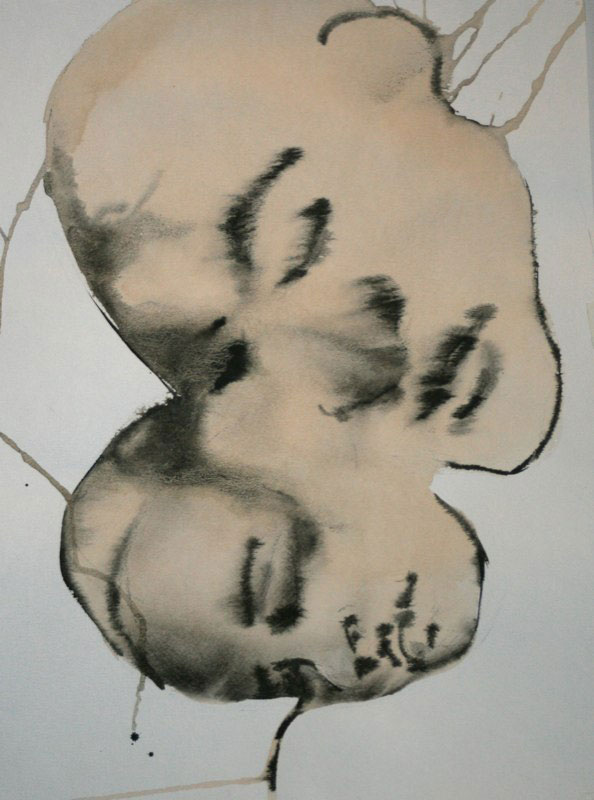
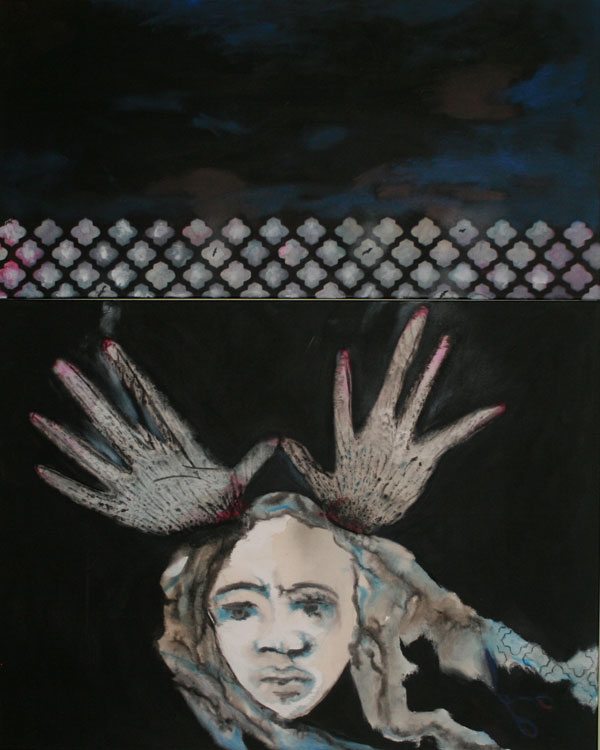
White Delusion
A pigment mutation
Kept us alive without light,
In the dark our eyes turned blue.
But we have come back to the lands of the sun;
Our whiteness
Dangerous.
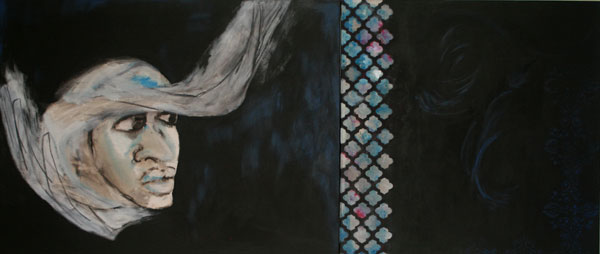
Colonialization leads to migration
The people of the North took from the people of the South.
The people of the South are coming to the North.
The people of the West took from the people of the East.
The people of the East are coming to the West.
What if we all suddenly remembered?
What if we stopped being scared?
La colonización conduce a la migración
La gente del norte tomó de la gente del sur
La gente del sur está llegando al norte
La gente del oeste tomó de la gente del este
La gente del este está llegando al oeste
¿Y si de repente todos recordáramos?
¿Y si dejamos de estar asustados?
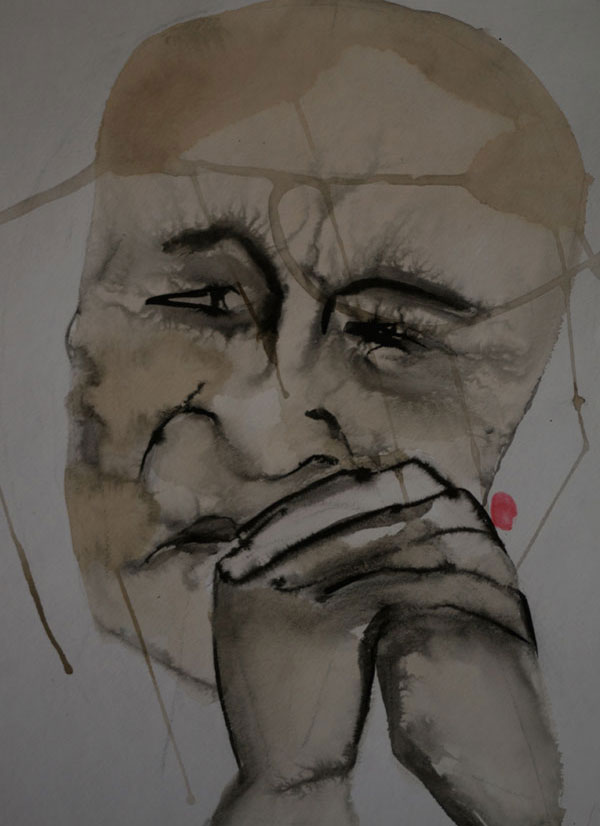

Not Native American
Who was America?
Some Italian adventurer?
Why did he get the whole shebang named after him?
My friend Gary Whitedear is a Choctaw,
He tells me
– I’m not Native American
I was here before America
America is not where I’m from
America happened to me.
When my car stalls he turns to tell me
“You have Injun trouble.”
Artist Statement – Alka Raghuram
I paint and make films to tell my stories and interpret the stories of others. I am an immigrant. I grew up in India and now live in America. The process of moving homes is also a process of becoming, of re-forming, of leaving the past and imagining a new story for yourself, that becomes a map for the future.
When I read stories of people fleeing their land and homes, of forced migrations, of refugees, my most intimate access to their experience is through evoking my own, and building on it with the published details of their lives. I imagine their stories, the pain, the horror, the helplessness, and the hope. It is this merging of self with the other that my paintings Self Portraits With Masks, Mermaids and Memory try to capture.
And in this spirit, I’d like to invite the viewers to imagine themselves with the masks and share their responses, any story, personal, from the news, fictional or imagined, that come to mind.
www.junoonpictures.com/junoonpictures@gmail.com
The short film is an excerpt from the multimedia performance YATRA (Journey), a collaboration between the late Pandit Chitresh Das (Kathak), Antonio Hidalgo Paz (Flamenco) and myself, exploring the similarities and differences between the two dance forms that share some historical roots, premiering at the Palace of Fine Arts in San Francisco in September 2014. The performance included a series of filmic vignettes, which were comprised of video, original artwork and poetry to connect the performance into a narrative of artistic journey and shared heritage.
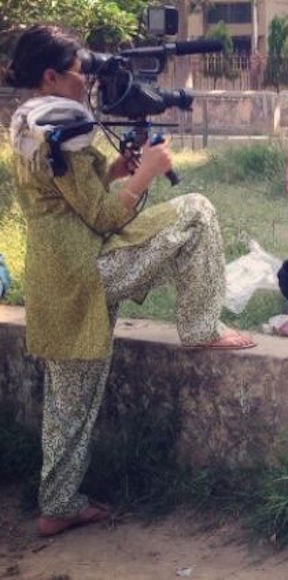
Alka Raghuram is a filmmaker and a multidisciplinary artist who just finished a feature documentary, Burqa Boxers, about Muslim women boxers in Kolkata India. Burqa Boxers was developed with the support of ITVS’ Diversity Development Fund. It was invited to the Open Doors co-production market at the Locarno Film Festival in Switzerland in 2011 where it was awarded the top prize Grant Open Doors. In 2012 Alka created a photo, video and art installation based on the project at the Locarno Film Festival. The project is partly funded by CNC, France.
In September 2014, Alka collaborated with dancers Pandit Chitresh Das (Indian, Kathak) and Antonio Hidalgo Paz (Flamenco) to create video vignettes for their performance Yatra (Journey) comprising of poetry, photography, painting and calligraphy about the historical connection between the two dance forms. The performance premiered at the Palace of Fine Arts in San Francisco.
Her fiction script “The Conqueror” was invited to Berlin Talent Project Market in 2008, and also Tribeca All Access, where Alka was awarded the L’Oreal Woman of Worth Vision Filmmaker Award.
Alka’s short films Tired of Dancing, Panchali and The Ant and The Monkey have screened at various festivals in the US and abroad. Panchali received the John Gutman award for innovation in cinema and was a regional finalist in the Student Academy Awards (2004). The Ant and The Monkey received the Emerging Arts Fund in Spring 2006 from The Peninsula Community Foundation, and was nominated for the Princess Grace Award in 2005. Her paintings have been exhibited in galleries and Museums in New York.
#Shiftingborders
Alka and I met in film school at the beginning of this century and became friends from first conversation. Over the years we have worked on each other’s projects and are both trusted editors of each other’s work. As part of our artists in residence month at The Wild Word Earth Issue we decided to do a collaborative set of paintings and poems addressing the issue of borders and migrations.
Our group works from the Bay Area in California, a privileged place at the edge of a giant continent that claims to police the world. We just had a show highlighting the Syrian refugee crisis. We also have a border just to the south where 60,000 migrant families arrived at the Southwest Border during the summer and fall of 2014. So the United States Department of Homeland Security (DHS) rapidly expanded centers of detention. It was a thought-out policy called “detention as deterrence.” This is contrary to international law. Now along the borders we have imprisoned women with their children without even assessing their claims. It is the largest incarceration of families since the notorious Japanese internment camps. They have no rights. They have no ability to leave. They have committed one crime, the usual crime—they are poor, and their governments will not protect or provide for them. They, like many humans before them, migrated looking for a better life. These issues among others, environmental borders, personal borders, are ones we focus on in our individual work.
Here is a link to find out more about this issue. https://grassrootsleadership.org/reports/profit-family-detention-meet-private-prison-corporations-making-millions-locking-refugee
Our group #shiftingborders is a diverse and fluctuating group of artists who all migrated to Silicon Valley because of the opportunities offered in the high-tech industry to our partners or ourselves. We all work in different mediums and believe different things. We are very happy this month to share our work with The Wild Word, a new magazine dedicated to excellence in art and committed to the same core beliefs as ourselves. Because if we share one core belief, it is that art is more powerful when it means something, when it addresses social injustice, and when it attempts to explore the crisis and strain our planet is under.
Emer Martin
California June, 10th 2016
Emer Martin is an Irish novelist, painter and filmmaker who has also lived in Paris, London, the Middle East, and the United States. Her first novel, Breakfast in Babylon won Book of the Year at the 1996 Listowel Writers’ Week. More Bread Or I’ll Appear, her second novel, was published internationally in 1999. Baby Zero was published in March 2007 and released internationally through the publishing co-operative Rawmeash based in the Bay Area California. Why is the Moon following Me? is her first children’s book.
She studied painting in New York and graduated from the Thomas Hunter Honors Program of Hunter College as class valedictorian in January 1998. She had two sell-out solo shows of her paintings at the Origin Gallery in Harcourt St, Dublin. She recently completed her third short film Unaccompanied. She produced Irvine Welsh’s directorial debut NUTS in 2007. She was awarded the Guggenheim Fellowship in 2000. Her new children’s book The Pooka will be released this Halloween 2016. Her fourth novel The Cruelty Men will be released in Ireland and the UK in 2017. She now lives in Palo Alto, California.
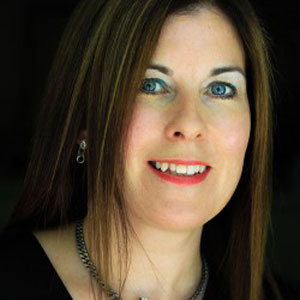
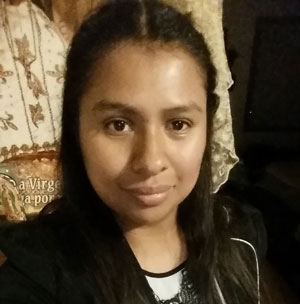
Translations of the poems are by Yesica López.
Yesica López was born in Oaxaca, Mexico. She is currently pursuing a teaching credential in SJSU. She lives in San Jose with her husband and three children. She believes strongly in education and building communities committed to social justice.
SHIFTING BORDERS
Poetry by Jennifer Gaskin
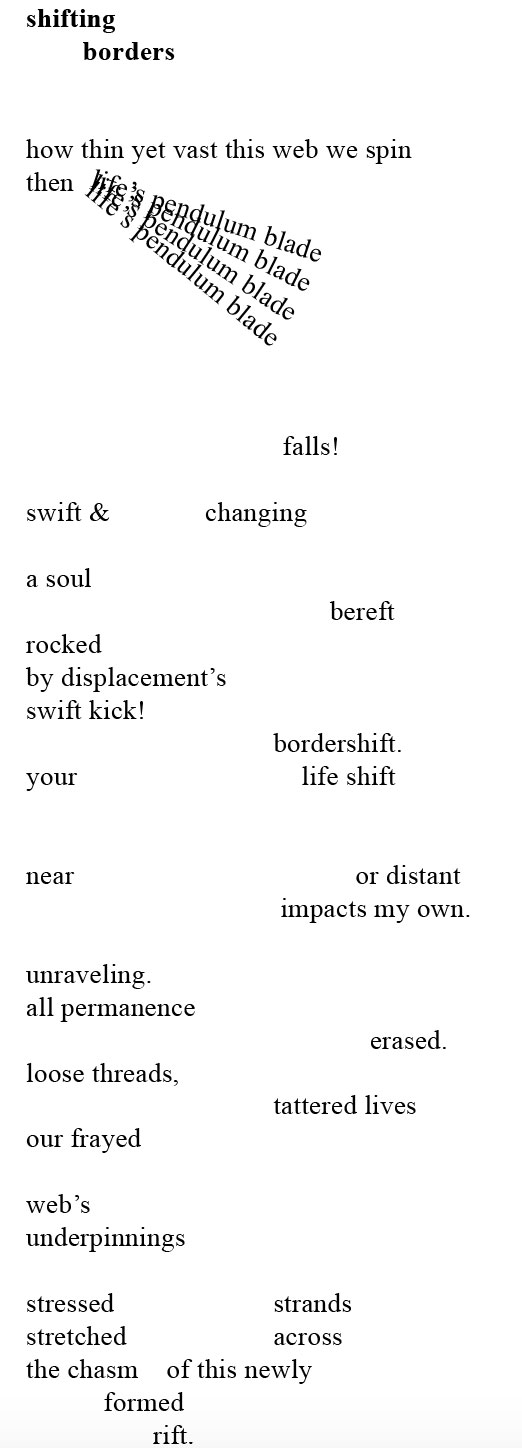


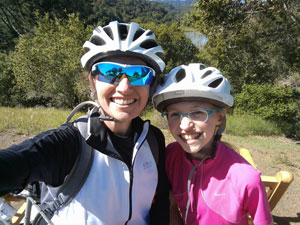
On the writing of ‘Uprooted’
Often when I write, my kids write, especially my eleven year old daughter Evelyn. While preparing recently for an upcoming show on refuges and displacement, I told her that if she wrote something worth putting into the exhibit, I’d include it. She was thrilled and came back twenty minutes later with a poem. It was sweet, but trite and not her best work. So I urged her to try again. This happened three more times, and it wasn’t until the morning of the opening of the show that she came to me with the raw form of this poem. I was deeply touched by her subtle and fresh analogy comparing the situation of the refugee to an uprooted flower. I was thrilled with her work. I dropped what I was working on and we spent the last hour before the exhibit opening editing it together.
ARTIST STATEMENT
Where does displacement happen? Is it solely tied to people during times of war? Through this series of poems, Jennifer Gaskin invites you to explore with her the impact that occurs when societies, communities and creatures are displaced.
Several of Jennifer Gaskin’s poems subtly employ a visual framework that help tell their story by their layout, as much as they do by their words. She hopes each poem becomes an intimate conversation between herself and the reader. Read more of Jennifer’s poems by signing up for her newsletter here or you can follow her on instagram @gaskincreative.
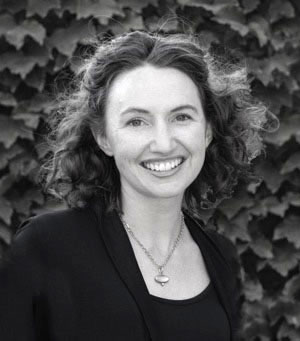
Jennifer grew up in a big family that read poetry together every week. While her training and vocation has been in the visual arts, writing poetry has always been simply another vehicle for personal expression. This spring, Jennifer came out with her first collection of poems, Skinny Dip in Vulnerable Verse.
Jennifer studied illustration and fine art at Brigham Young University. She currently works as an art director and UX specialist for an online training company.
She lives in Palo Alto, California where she continues to live a creative life with her family of four with whom she continues to read poetry every week.
ACROSS THE NEIGHBOR’S FENCE
PHOTOGRAPHY BY ALPANA ARAS
Artist Statement – Alpana Aras
I felt a connection to Cuba long before I got there. A connection born from my Indian roots as an immigrant to a foreign land. Drawing from my personal history, I wanted to fashion stories with the common thread of hope that ties us together—the hope for a better life than the one we have, one that transcends borders. My camera was an instrument for documenting everyday people, and connecting with them across language barriers to share stories.
In my photo of a boy looking across the neighbor’s fence, is he wanting to be a part of their world or simply wanting to play with a toy out there? It feels out of reach to him with the border in between. How different is he from any of us? Human nature is such that we want something we don’t have. Sometimes, even with abundance we still want more.
Upon arrival, Cuba presented itself as an old, familiar place where time had stood still. It is the stereotypical picture of the country that you might see in your mind’s eye, with the classic cars and art deco architecture. However, I had a different vision of documenting Cuba. One that would look beyond the clichés of the cars, beaches, and cigar smokers. One that would look into the hearts of the people, and in that moment, give me a glimpse of the shifting landscape of the future.
On the surface, it seems that there is hope for change. But this seems slow. Some say it may be the inefficiency of the system, or reluctance on behalf of the government officials. There are nuggets thrown at the people to show change. Like lowering the price of primary necessities such as oil from 50 to 10 cents. But then they increase the price of cigarettes by 10 cents, which brings forth a feeling of distrust, of being given something but having something taken in return. In spite of the day-to-day challenges of the governing regime the resolute people of Cuba carry on.
My hope was to showcase a glimpse of the lives of everyday people in Cuba in a meaningful fashion. When people see my art, I want them to have a small taste of the world that I walked into, one that I hoped to capture as it exists.

Based in San Francisco, Alpana Aras is an award-winning lifestyle and portrait photographer originally from Mumbai, India. Her formal art-school and advertising agency background go hand in hand with her ability to see the big picture. In her work she strives to find the story in life’s everyday moments. Her work can be seen at www.storyboxart.com and www.alpanaaras.com
CONTINENTAL DRIFT
MUSIC BY SUSAN LEECH
Artist’s Statement
As a musician, I find inspiration in events that effect people and communities, both personally and more broadly on a global scale. My work often takes me to remote communities, and puts me in touch with people who are deeply connected to the land. I am fascinated by the culture of the west that tends to remove people from ecology, as though we are somehow not affected by or can stand apart from the changes that occur within our environment. A lot of my songs focus on this disconnect. We are a very transient society—we can move to a place, make money there, raise our children there, but not feel deeply connected to it or compelled to look after it. Most of the people living in the communities I work with are deeply connected to their immediate landscape, and their need to look after their own health and culture is inextricably tied to looking after the lands and waters around them.
I was inspired to write about the refugee crisis partly because of the empathy we feel for people who are forced out of their homes and partly because of the fear and helplessness we feel about having our lives affected by a crisis that is so far away. But the situation also inspires me because—to me, at least—the roots of this crisis and other situations of violence around the world are intimately connected to our continuing drive to stretch our ecological bounds to the breaking point.

Susan Leech is a biologist and a singer/songwriter. While balancing her musical pursuits with her interests in people and conservation, she has written songs that encompass topics ranging from sand dune conservation to the ironies of life in Fort McMurray. She currently works with Indigenous communities in Canada to express and enforce their rights and interests in the face of rapid industrial, environmental, and cultural change.
Musically, Susan has played with her band Exhale in Vancouver, Canada for more than 10 years, focused on singing, harmonica and flute. Most of her musical collaboration is long distance these days, relying heavily on technology and occasional face-to-face weekends in Sechelt, British Columbia. Exhale are currently recording their second edition of the Sechelt Sessions.
CHANGE
ART BY MOITREYEE CHOWDHURY
Artist Statement – Moitreyee Chowdhury
My work is about the changing landscape. This landscape consists of people, of the land, of criss-cross cultures, the clothes people wear, the way they live. There is no room for judgment; just a fluid, ever-shifting landscape. My painting starts with the European landscape that was relatively structured, evenly laid out, organized. And now people are moving. More and more new elements come in to create a different pattern, changing the landscape. Everything is unsettled. But if we look closely, we will find ourselves in that new landscape. The colors are different, but the element is the same. The same striving for love, family, survival, education, and for life to be settled. This is the time to embrace this new pattern, and create a new harmonious landscape, that is beautiful and colorful. A landscape that has been added to and never diminished.

Moitreyee Chowdhury was born and raised in Delhi, India, and now lives in the USA. After getting a BFA from the College of Arts in Delhi, Moitreyee learned German and did an internship with the Theater Das Tat in Frankfurt, Germany. Circumstances brought her to California, where mentors and artists Paddy Moran and Katie Frank led her to the few years of intensely exploring more materials and thoughts that shaped her creative thinking process. For her art, Moitreyee derives inspiration from her surroundings and the people who are in it. She is motivated by the kindness and compassion of human beings that she sees around the world and hopes to spread the same with her work. You can see more of her work at her website www.moitreyee.com

